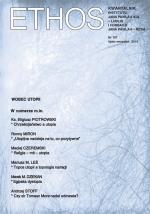 zobacz powiększenie | DOI 10.12887/27-2014-3-107-07 Agnieszka LEKKA-KOWALIK – Utopian Thinking in Science, about Science, and Owing to Science: A Source of Inspiration or a Source of Risk? Cena brutto: 7,00 PLN |
|
The author considers a schema of utopian thinking in the context of science. Her starting point is an ambiguity inherent in the Greek etymology of the term ‘utopia’: outopos, i.e., ‘non-existing place’ and eutopia, i.e., ‘good place.’ This ambiguity signifies a gap between what is and what should be: a truly good place for human beings does not exist. Implicit in this thinking is also a diagnosis concerning the actual world: it is not as it should be. Based on this recognition, a utopia becomes a project of building the perfect world – the one that should be. A reasoning of this kind may be also found in science: the knowledge we have is insufficient and therefore a constant scientific progress is necessary regardless of its consequences. There are also (1) utopian conceptions of science, expressing the conviction that actual science is not as it should be and therefore better paradigms of doing science should be constructed, and (2) utopian science policies reflecting the opinion that science does not achieve the expected results, and thus knowledge-seeking activities should be forced into procedures designed by the governing bodies in order to obtain the desired scientific results. Science can also be a source of utopias understood as possible alternatives to the contemporary organization of the world; utopias may be a consequence of the development of science; and finally, science can also make a utopian project attractive by insisting that human beings and the world are simply the ‘material’ and ‘resources’ to be reshaped in accordance with a desired conception. The author defends the thesis that utopian thinking may be identified as exemplifying certain ‘primacies,’ for instance, the primacy of ideas over beings, of procedures over human beings, of social structures over individual persons, of control over understanding, of appearance over the reality, of thinking over cognizing, of methods over objects, of paradigms over facts, and of efficiency over truthfulness. A characteristic mark of the thinking in question is that the primary element of each pair is a correlate of the consciousness rather than a cognitive result as such. In consequence, theoretical cognition is replaced with ‘artistic’ creation, thus entering the realm of poiesis. Accepting primacies of this kind changes science into the utopia the harmful effects of which have already been suffered in history both by science itself and by the societies subjected to such attempts. The introduction to the considerations characterized above includes analyses of some aspects of utopia conceived of as a social project. Keywords: science, utopia, theories of science, science policy, utopistics, techno-scientific utopia, the concept of poiesis-like cognition Contact: Department of the Methodology of Science, Institute of Theoretical Philosophy, E-mail: alekka@kul.lublin.pl Pliki do pobrania: » Lekka_kowalik.pdf | |
